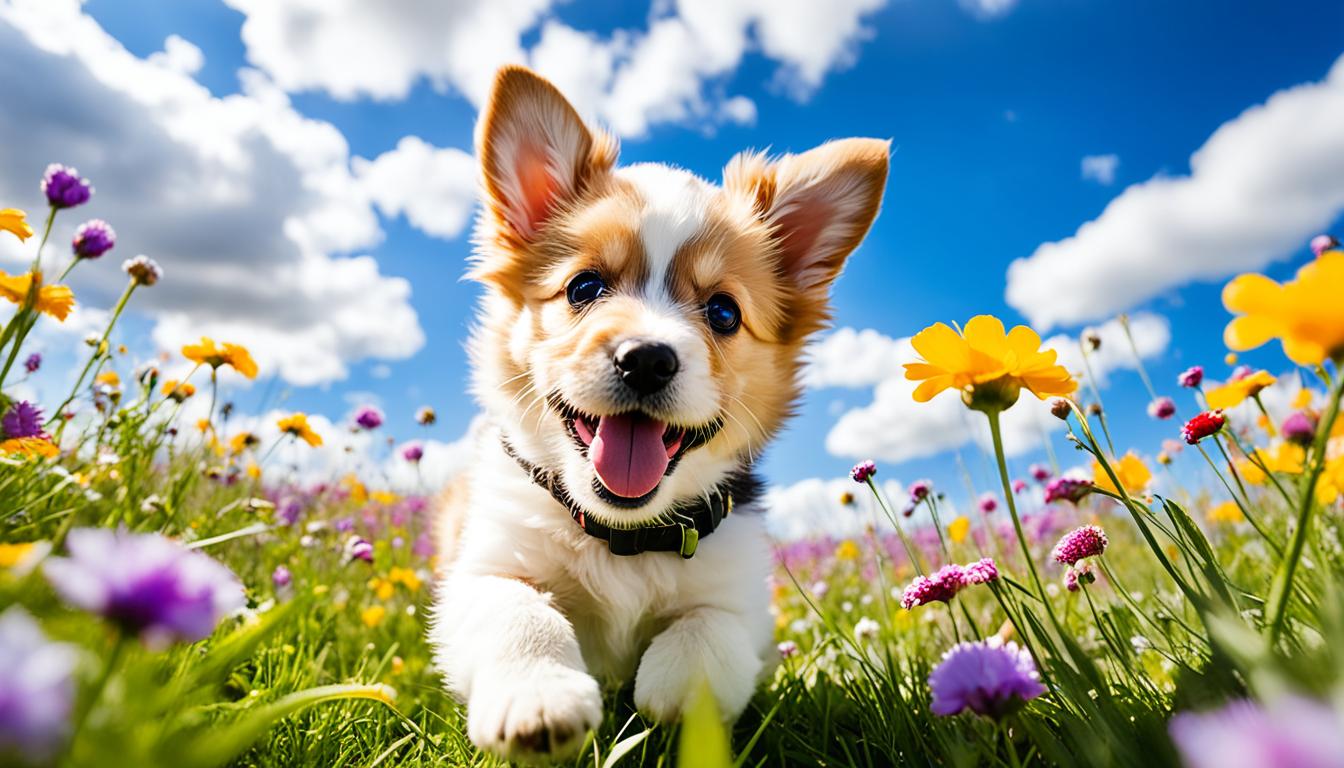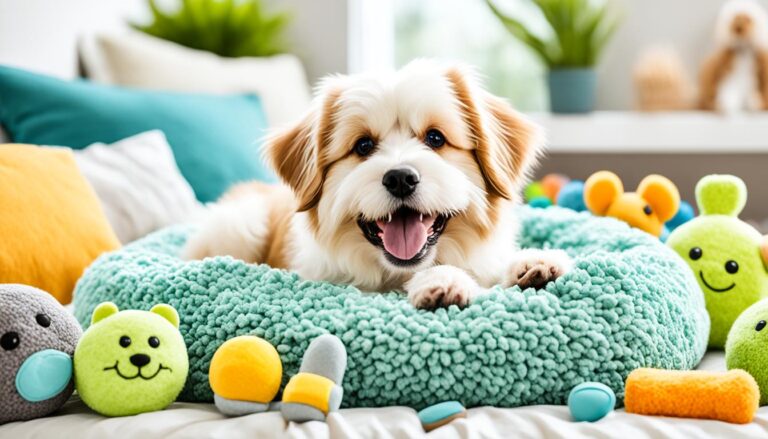Quite Puppy Health Tips for Happy Pups
Welcome to our guide on maintaining puppy health and providing the best possible care for your furry friend. As responsible pet owners, it is our aim to ensure that our puppies grow into healthy, happy, and well-adjusted adult dogs. In this section, we will share essential tips and advice on puppy health care to help you in this exciting journey.
Key Takeaways:
- Connect with a vet you trust to address your puppy’s health needs and schedule regular check-ups.
- Choose a high-quality puppy food and adjust the feeding schedule as your pup grows.
- Prepare essential supplies like a crate, bedding, bowls, leash, toys, and grooming items before bringing your puppy home.
- Crate train your puppy for potty training and provide a safe space.
- Implement a potty training schedule, use positive reinforcement, and reward your puppy for going outside.
Ensuring Proper Puppy Health Care
When it comes to caring for your furry bundle of joy, ensuring proper puppy health care is crucial. By following a few essential steps, you can help your puppy grow into a healthy and happy adult dog. Let’s dive into the puppy health checklist and guide you through the necessary measures to keep your pup thriving.
Establish a Routine from the Start
Creating a consistent schedule for meals, potty breaks, exercise, and playtime provides structure and security for your puppy. Stick to the routine to help them feel safe and establish healthy habits.
Get Them Used to Being Handled
Grooming activities such as brushing, bathing, nail clipping, and teeth brushing are essential for your puppy’s hygiene. Gradually introduce these experiences to them, ensuring they feel comfortable and relaxed during grooming sessions.
Socialize, Socialize, Socialize
Exposing your pup to various environments, people, animals, and experiences is crucial for their development. Socialization helps them develop good social skills, preventing fearfulness or anxiety in new situations.
Keep Them Active
Regular exercise, such as walks, playtime, and mental stimulation, is vital for your puppy’s physical and mental well-being. Provide plenty of opportunities for them to burn off energy and stay healthy.
Get Your Pup Vaccinated
Follow the recommended vaccination schedule given by your veterinarian. Vaccinations protect your puppy from deadly diseases and ensure their long-term health. Don’t forget to discuss any additional vaccines that might be necessary, depending on your location and specific needs.
Feed Them a Balanced Diet
Choose a high-quality puppy food that meets their nutritional needs. Consult with your veterinarian to determine the appropriate diet for your puppy’s breed, size, and age.
Keep Them Clean
Regular bathing, fur brushing, teeth cleaning, and annual vet check-ups are important for maintaining your puppy’s hygiene and overall health. These activities help prevent dental issues, skin problems, and detect any potential health concerns early on.
Protect Them from Pests
Use appropriate products and medications to prevent fleas, ticks, mosquitoes, and heartworms from harming your puppy. Consult with your veterinarian to find the most suitable preventive measures for your area.
Train Them
Start early with basic obedience training to help your puppy develop good manners, respond to commands, and build a strong bond with you. Positive reinforcement and consistency are key to successful training.
Spay or Neuter Them
Consider the benefits of spaying or neutering your puppy. Besides preventing unwanted behaviors, such as marking and aggression, it can also reduce the risk of certain health problems in the future. Consult with your veterinarian to determine the best time for this procedure.
Remember, providing proper puppy health care is a lifelong commitment. By implementing these measures, you can ensure your puppy grows into a healthy and happy canine companion. Now that we’ve covered proper puppy health care, let’s move on to the final section of our puppy health guide, where we’ll discuss maintaining puppy health, including a healthy puppy diet and common puppy health problems.
Conclusion
Raising a happy and healthy puppy requires our proper care, attention, and commitment. By establishing a routine, feeding them a balanced diet, and keeping them active, we can ensure they maintain good health throughout their lives.
Regular vet check-ups, vaccinations, and preventive measures against pests are essential for their overall well-being. These measures help to identify and prevent potential health problems early on, ensuring our puppies stay healthy and happy.
Training and socialization are also vital for our puppies’ development. By providing appropriate chew toys and engaging in positive reinforcement training, we can shape their behavior and foster a strong bond with them. This not only helps prevent behavioral problems but also establishes a foundation of trust and cooperation.
With patience, consistency, and love, we can raise a puppy that grows into a healthy, well-adjusted, and happy adult dog. Remember to cherish the special moments and enjoy the journey of raising a furry companion who will bring joy and companionship to our lives.
FAQ
What should I consider when choosing a vet for my puppy?
When choosing a vet for your puppy, it’s important to find someone you trust and feel comfortable with. Ask about their philosophy, fees, and policies, and schedule a first appointment early on.
What should I feed my puppy for optimal health?
Choose a high-quality food designed for puppies and adjust the feeding schedule as they grow. Consider the nutritional needs of growing puppies, including the importance of healthy fats for brain and eye development.
What essential supplies should I have for my puppy?
Before bringing your puppy home, make sure to have essential supplies such as a crate, bedding, bowls, leash, toys, and grooming items ready.
How can I crate train my puppy effectively?
Utilize a crate for potty training, providing a safe space, and encouraging alone time. Make the crate comfortable and introduce it gradually to avoid negative associations.
What is the best way to potty train my puppy?
Implement a potty training schedule, use the crate as a tool, establish a verbal cue, and reward your puppy for going outside.
Is early training important for puppies?
Yes, consistent training from the beginning helps establish a desired relationship and teaches good habits. Consider areas like sleeping arrangements, avoiding bad habits, setting boundaries, and building a strong bond.
Why is socialization important for puppies?
Socialization is crucial to expose your puppy to new experiences, people, animals, and environments in a positive way. This helps promote confidence and prevent anxiety and behavioral problems.
How can I prevent separation anxiety in my puppy?
Gradually acclimate your puppy to being alone, start with short absences, associate your absence with positive experiences, and tire them out before leaving to prevent separation anxiety.
How much exercise does my puppy need?
Provide regular physical exercise and mental stimulation through walks, active play, and interactive toys to keep your puppy healthy and happy. The amount of exercise depends on their breed, age, and individual needs.
How can I establish a routine for my puppy?
Create a consistent schedule for meals, potty breaks, exercise, and playtime to provide structure and security for your puppy.
How can I introduce grooming activities to my puppy?
Help your puppy become comfortable with grooming activities like brushing, bathing, nail clipping, and teeth brushing by gradually introducing them to these experiences.
When should I get my puppy vaccinated?
It’s important to follow the recommended vaccination schedule to protect your puppy from deadly diseases and ensure their long-term health. Consult with your veterinarian for the appropriate vaccines and timing.
What should I do to maintain my puppy’s hygiene?
Regularly bathe your puppy, brush their fur, clean their teeth, and schedule annual vet check-ups to maintain their hygiene and overall health.
How can I protect my puppy from pests?
Use appropriate products and medications to prevent fleas, ticks, mosquitoes, and heartworms from harming your puppy. Consult with your veterinarian for the best preventive measures.
Is training important for puppies?
Yes, early basic obedience training helps puppies develop good manners, respond to commands, and build a strong bond with their owners.
Should I spay or neuter my puppy?
Consider the benefits of spaying or neutering your puppy, such as preventing unwanted behaviors and reducing the risk of certain health problems. Consult with your veterinarian to make an informed decision.
What are some tips for raising a happy and healthy puppy?
Raising a happy and healthy puppy requires proper care, attention, and commitment. Establishing a routine, feeding them a balanced diet, providing exercise, regular vet check-ups, training, socialization, and preventive measures are all important aspects of their overall well-being.









2 Comments